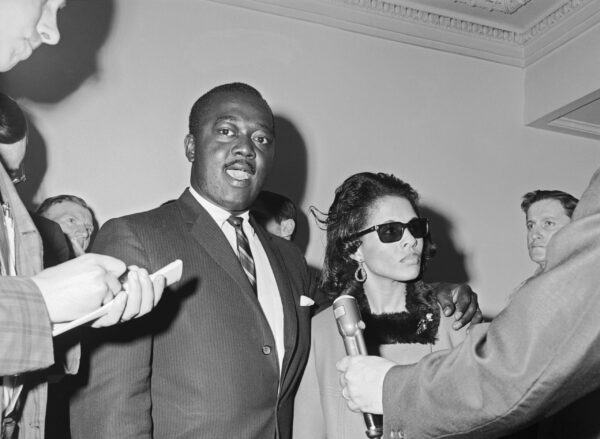The First Black man to serve on the White House Secret Service security detail has been pardoned, almost 60 years after being accused of betraying his country in a bribery scheme. The octogenarian, who is currently in poor health, says he accepts the “justifiable action by President Joe Biden with sincere gratitude.”
On Tuesday, April 26, Abraham Bolden, 87, was among 78 people granted pardons or commutations for their sentences, making history as beneficiaries of Biden’s first use of his executive clemency powers.

In 1961, almost 61 years ago, a chance meeting in a bathroom at the McCormick Place Convention Center led to the Chicago native becoming the first African-American to serve as security to a president.
President John F. Kennedy said to the 26-year-old, “Has there ever been a Negro Secret Service agent on White House detail in Washington, D.C.?”
Bolden said, “I told him, ‘Not to my knowledge, Mr. President.’ And he asked me if I would like to be the first, and I told him, ‘Yes, sir, Mr. President.’ ”
Within two months he was hired, and according to Bolden, immediately he started to encounter “harsh racism” within the Secret Service ranks, including racial slurs, bigoted remarks and tiny nooses left around his workstation.
In addition to the discrimination he said he encountered, he reportedly observed his peers’ negative on-duty behavior like drinking and womanizing while on the job. Ultimately, he reported what he saw to his superiors, which led to an intense backlash against him.
According to Bolden, after the president was assassinated in Dallas in 1963, he was accused of soliciting a $50,000 bribe to sell a copy of a Secret Service file to a ring of counterfeiters.
He was promptly sent from Washington D.C., back to Chicago, but this time with the shameful accusation of a federal crime. Over the last six decades, he has maintained his innocence, though he served roughly three years in federal prison and was rejected for a pardon by presidents Richard Nixon, Bill Clinton and Barack Obama.
In a statement on Tuesday, he said, “The aftermath of Kennedy’s assassination led to events that would implicate me in a case of bribery. After two high-profile trials, held before a trial judge who told the deliberating jury to find me guilty, I was convicted and served a six-year sentence.”
In his 2008 memoir, “The Echo from Dealey Plaza,” written at the urging of his late wife Barbara, he spoke about his life being turned upside down by the bribery accusation and the thin thread of racism stitched throughout his conviction.
Years later, he feels his voice finally has been heard and he is vindicated. This is evidenced by a statement made by the White House about Bolden’s clemency, stating, Bolden “has steadfastly maintained his innocence, arguing that he was targeted for prosecution in retaliation for exposing unprofessional and racist behavior within the U.S. Secret Service.”
The White House spoke about how this man, who once was trusted to guard the life of one of the nation’s most beloved presidents, was convicted of a crime, “even though key witnesses against him admitted to lying at the prosecutor’s request.”
Bolden’s case was heavily advocated by Chicago Sun-Times columnist Mary Mitchell, who wrote an article in January, titled, “It’s long past time to finally clear first White House Black Secret Service agent’s name.”
Referencing his book, she wrote, “After he complained about agents drinking on the job and showing up unfit for duty and after he threatened to reveal the agency’s shortcomings in protecting the president, he was charged with bribery in a case involving a counterfeiting defendant. After being tried twice, he was convicted in 1966 and was sentenced to six years in federal prison. He served three years and nine months behind bars.”
She returned to her campaign to clear his name just weeks ago saying, “an assignment that should have brought Bolden great honor ended up causing him greater harm.”
She chronicled how in his memoir Bolden wrote of becoming “a real problem for the Secret Service when he threatened to reveal the agency’s shortcomings in guarding the president,” she wrote.
A presidential pardon is not an acknowledgment of innocence, according to the US. Justice Department, but an “expression of the President’s forgiveness and ordinarily is granted in recognition of the applicant’s acceptance of responsibility for the crime and established good conduct for a significant period of time after conviction or completion of sentence.”
“It does, however, remove civil disabilities — e.g., restrictions on the right to vote, hold state or local office, or sit on a jury — imposed because of the conviction for which pardon is sought, and should lessen the stigma arising from the conviction.”
Either way, Bolden can move forward knowing that someone in the office he once swore to protect has heard his story and in one way or another vindicated him.


